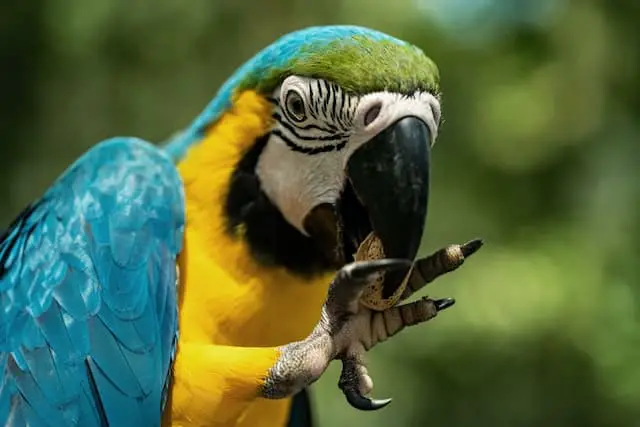Personally, this accident happened to me when I was I kid. I had 2 budgies, and they were not trained or tamed, so I thought why not train them? Of course, training for me was about letting the bird out of the cage to catch it and release it again and repeating the process. And the result was the bird flying away and never back. And in this article, we will dive into everything about parrot flying away, how to prevent it, and many more.
And, without further ado, let’s get into this.

Why Do Parrots Fly Away?
There are 2 scenarios when a parrot flies away. The first one is with wild parrots, and for them, flying away is their instinct because they will perceive humans as potential threats, and as you know, parrots fall low on the food chain, so they are more likely to fly away.
The second scenario happens with pet parrots, and there are a few reasons parrots fly away. And these may include:
- The Parrot Still Untamed
- Lack Of safety
- Loneliness
- Lack Of Supplies
- Stressfull Enviroment
Of course, parrots may fly away just because of a fragile cage. But here I will discuss what may lead any pet parrot to develop such a desire, and how to prevent that.
Untamed Parrot
This is the most obvious reason a parrot may fly away and escape. As an owner, you may provide your bird with everything it needs from food, safety, and everything. But, the problem is, untamed parrots don’t see that, and they don’t understand why they are living in a cage with another living being that might attack them someday.
So, the instinct of an animal that falls low in the food chain will be persistent and hits every time you come closer to the cage, at least until you tame your parrot.
So in a such condition, the parrot may wait for the chance to get out and fly away, and some parrots will learn how to open the cage by themselves, which happened with one of my African grey who escaped out of the cage after breaking it with its strong beak. Luckily, I got him back because I clipped his wings earlier that week, so he couldn’t fly far away.
No Safety
Safety is a huge issue for the parrot, and even tamed parrots will feel vulnerable sometimes, especially in large families with more pets like dogs and cats. Socializing your parrot with your family member may resolve the insecurities coming from family members. But resolving the insecurities coming from other pets like dogs and cats is way harder.
So, naturally, the instinct will hit and the parrot will develop the desire to escape the household.
Loneliness
Loneliness is another issue the pet parrots often have, especially as pets. You may think that parrots can feel ok if the owner is around them 2-3 hours a day, and this is totally wrong. Parrots need to stimulate their brain to maintain their mental health, and the only thing available for them to do that is to interact with owners of another cage mate.
Loneliness can also affect physical health and lead to refusal of food and feather plucking. And if the lonely bird gets a chance to escape, it will take without hesitation. So, make sure you interact with your bird enough so the bond and loyalty between you get to higher levels.
Insufficient Diet
An insufficient diet system can lead the parrot to look for food outside, and when the chance comes, the parrot will fly away even if it was tamed and socialized. This issue is really common among pet parrots and you should look after and provide your bird with a diversified diet containing seeds, nuts, fruits, and veggies.
This problem can also cause the parrot to develop serious mental health like depression, anxiety, and aggressiveness.
Bad Environment
The most important thing when raising a parrot is to provide the optimum place to live. A place where your bird will stay safe, stimulant, and clean. The living room in your house makes a great place for your parrot’s cage or stands. But make sure it’s completely safe.
Apart from that, the temperature should be optimum, you don’t want your parrot to get sick from cold or hot weather. 27-degree Celsius is the best for most parrots.
How To Prevent Your Parrot From Flying Away?
Solving the previous reasons will significantly decrease the possibility of a parrot flying away. However, parrots are still exotic animals, and their instinct might hit at any moment. Here are 5 ways to make sure your parrot won’t fly away.
Use Strong Cage
A steady cage will prevent parrots from flying away. Even if the previous 6 reasons exist. However, it’s not healthy to depend only on the cage without solving the issues that the bird may suffer from.
Train Your Parrot Not Fly Away
Conducting this training may fail and the parrot might fly away. However, if you succeed in training your parrot, expect a parrot that can fly outside and come back when calling for its name. And this shows the optimum bond between a parrot and its owners.
Use Harness
Using harnesses is also a good idea for parrots who often go outside with owners. And it is also good when you intend to keep your parrot without a cage, which is possible after certain training.
Clip Your Parrot’s Wings
Clipping the wings is really common when the parrot is untamed and the owner is willing to train and tame the bird. However, this could hurt the bird and it requires experience to avoid over-clipping and only clip what will prevent the parrot from flying. Besides that, clipping is not really practical if you want to do it just to prevent the parrot from flying away. Only do it when you want to tame and train your parrot.
Enrich The Environment
Cleaning and providing safety in the place where you put the cage is essential, and if you can add some toys, treats, decoration, etc, this can help the parrot get attached and bond to the place.
Can You Take Your Parrot Outside?
Yes, you can take your parrot outside, but it should be tamed and bonded to you, and preferably trained not to fly away, and if not, you can use a parrot harness or portable cage which you can use to get into planes and travel.
Do Parrots Come Back If They Fly Away?
If the parrot is from a smart breed, bonded to the owner, has healthy and delicious food, then there is a possibility the parrot will come back because he missed home and still remembers the way back. But it is rare to happen and most parrots will fly away and never come back because they feel lonely or for any of the reasons stated earlier. Or simply, the bird will lose its way back, which is common even with trained and loyal parrots.
Can Pet Parrots Survive In The Wild?
This is a question the owners may ask when their lovely friend accidentally flies away, and the answer depends on the parrot breeds. Some parrots are living widely in many areas of the states, just like quaker parrots who live wildly almost in any place in America, and this will increase the chance of surviving after flying away.
Other breeds, like cockatoos and macaws, may suffer after flying away because there are no wild flocks that they can join and continue living. They may find food, but in most cases, it won’t be enough. Apart from the safety, which can decline after flying away.
Basically, pet parrots will find it hard and often impossible to survive in the wild after flying away, yet it is still possible.
How To Get Back Your Parrot
If your parrot flew away, don’t lose hope. Some parrots will understand come back when they feel hungry, not precisely back to you, but they will land in any similar area of their own house (Your house) to get food. So you can make an announcement and preferably a printed picture in the surrounding neighborhoods just in case the parrots have landed in an area close to you.
You can put the cage of your parrot outside your house in the yard or in an exposed area where the bird can see if flying above the area in the hope the parrot will recognize its home. You can put food and treats inside the cage in case the bird is hungry.
Conclusion
In conclusion, parrots may take any chance to fly away for many reasons, like lack of safety, food, social interaction, food, boredom, and many more. And the best way to prevent that is to enrich the parrot’s environment by providing everything a parrot needs, like toys, food, treats, social interactions, and training preferably from younger ages as parrots raised by owners from a young age are extremely loyal.
And yes, that’s about it. Hope you found this article informative and easy to digest. Thank you for reading …

Hello, my name is sadeq and I am obsessed about parrot And I am here to share everything about raising pet parrots and how to be good owners to your bird.







